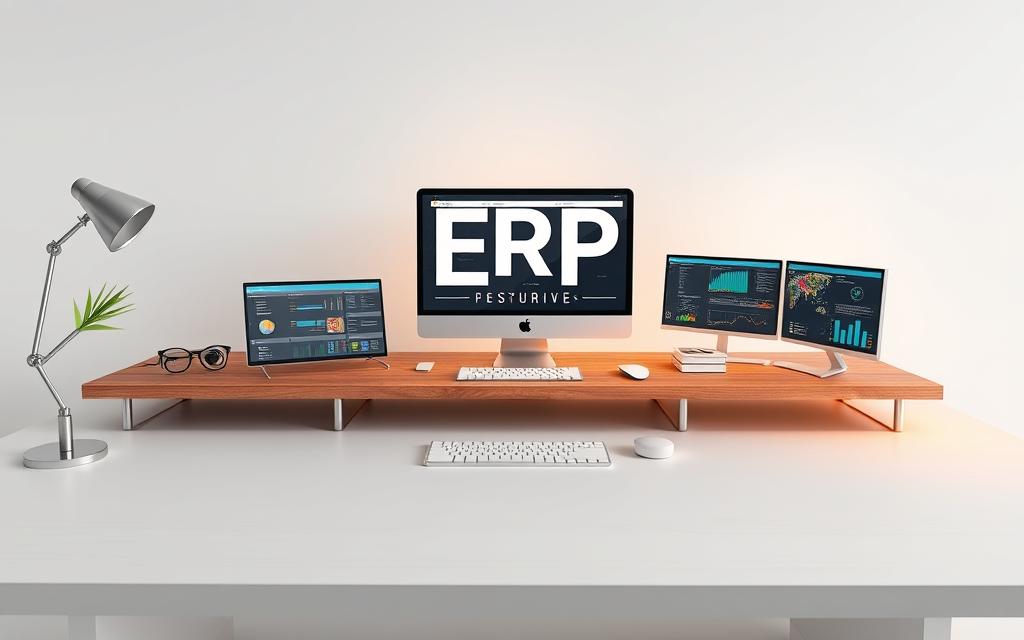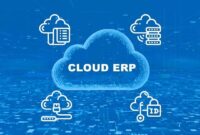In today’s fast-paced business landscape, enterprise resource planning systems play a crucial role in driving success. These systems help organizations streamline operations, enhance productivity, and make informed decisions.

Effective erp platforms integrate various business functions, such as finance, human resources, and supply chain management, into a single, unified system. This integration enables businesses to respond quickly to changing market conditions and customer needs.
By implementing the right erp platforms, businesses can achieve significant benefits, including improved efficiency, reduced costs, and enhanced customer satisfaction. In this article, we will explore the best enterprise resource planning systems available, helping you make an informed decision when selecting the ideal solution for your organization.
What Makes ERP Systems Essential for Modern Businesses
ERP systems are no longer a luxury but a necessity for businesses aiming to thrive in a competitive market. The integration of various business functions into a single system has revolutionized the way companies operate.
The Evolution of Enterprise Resource Planning
Initially, ERP systems were on-premise solutions that required significant upfront investments. However, with the advent of cloud-based ERP solutions, businesses can now access these systems via the cloud, reducing costs and increasing scalability.
Key Benefits of Implementing ERP Solutions
The implementation of ERP solutions offers numerous benefits, including enhanced efficiency, improved decision-making, and better resource allocation. By leveraging best ERP software, businesses can streamline their operations and gain a competitive edge.
Types of ERP Platforms Available Today
Today, businesses can choose from multiple ERP platforms, each designed to address specific organizational needs. The diversity in ERP solutions allows companies to select the most appropriate system based on their operational requirements, scalability needs, and IT infrastructure.

ERP platforms can be broadly categorized into three main types: cloud-based, on-premise, and hybrid solutions. Each type has its unique characteristics and advantages.
Cloud-Based ERP Solutions
Cloud-based ERP solutions offer flexibility and scalability, enabling businesses to access their ERP systems from anywhere. These solutions are typically provided by ERP vendors such as Oracle, SAP, and Microsoft, who offer robust cloud infrastructure. Key benefits include reduced IT costs and simplified system maintenance.
On-Premise ERP Systems
On-premise ERP systems are installed locally on a company’s own servers. This type provides greater control over data security and customization. However, it requires significant upfront investment in hardware and IT resources. Top ERP platforms like SAP S/4HANA and Oracle E-Business Suite offer comprehensive on-premise solutions.
Hybrid ERP Implementations
Hybrid ERP implementations combine elements of both cloud-based and on-premise solutions. This approach allows businesses to leverage the benefits of cloud scalability while maintaining sensitive data on-premise. Hybrid models offer flexibility and are suitable for organizations with complex IT requirements.
Critical Features of Leading ERP Platforms
Modern ERP systems are designed with a range of critical features that enable businesses to optimize their operations. These features are crucial for streamlining processes, enhancing efficiency, and supporting business growth.
Core Functional Modules
Core functional modules in ERP platforms include financial management, supply chain management, and human capital management. These modules are designed to work seamlessly together, providing a unified view of business operations. Financial management modules, for instance, enable companies to manage their financial transactions, accounts payable, and accounts receivable efficiently.
Scalability and Customization Capabilities
Scalability and customization are vital for businesses with evolving needs. Leading ERP platforms offer scalable solutions that grow with the business, along with customization capabilities that allow companies to tailor the system to their specific requirements. This flexibility ensures that the ERP system remains relevant and effective over time.
ERP Integration Tools and APIs
ERP integration tools and APIs are essential for connecting the ERP system with other business applications. These tools enable seamless integration with third-party software, enhancing the overall functionality of the ERP platform. Examples include APIs for integrating with e-commerce platforms, CRM systems, and other business software.
| Feature | Description | Benefit |
|---|---|---|
| Core Functional Modules | Includes financial, supply chain, and human capital management | Unified view of business operations |
| Scalability and Customization | Allows for growth and tailored solutions | Flexibility and adaptability |
| ERP Integration Tools and APIs | Enables connection with other business applications | Enhanced functionality and interoperability |

Top Enterprise ERP Platforms for Large Organizations
The right ERP platform can transform the operational efficiency of large organizations, and several top-tier solutions are available today. These platforms are designed to meet the complex needs of large enterprises, offering a range of functionalities that can be tailored to specific business requirements.
SAP S/4HANA
SAP S/4HANA is a next-generation ERP solution that leverages advanced technologies like AI and machine learning to provide real-time insights and streamlined processes.
Overview and Key Features
SAP S/4HANA offers a suite of integrated tools for financial management, procurement, and logistics, among others. Its real-time data processing capability enables swift decision-making.
Pros and Cons
The pros include enhanced operational efficiency and predictive analytics. However, the complexity of implementation and cost can be significant drawbacks.
Implementation Considerations
Organizations should consider their IT infrastructure readiness and the need for comprehensive training programs when implementing SAP S/4HANA.
Oracle NetSuite
Oracle NetSuite is a cloud-based ERP solution that provides a comprehensive suite of business management tools.
Overview and Key Features
Oracle NetSuite offers scalable and flexible solutions for financials, CRM, and e-commerce, all integrated within a single platform.
Pros and Cons
The cloud-based nature offers reduced IT costs and enhanced scalability. However, customization can be challenging.
Implementation Considerations
Businesses should assess their data migration needs and plan for comprehensive training when adopting Oracle NetSuite.

Microsoft Dynamics365
Microsoft Dynamics365 is a suite of intelligent business applications that connects ERP and CRM capabilities.
Overview and Key Features
It offers integrated business processes and intelligent insights through its various modules, including finance, supply chain, and sales.
Pros and Cons
The integration with Microsoft tools is a significant advantage, offering seamless productivity. However, the complexity can be a barrier.
Implementation Considerations
Organizations must consider their existing Microsoft ecosystem and the need for change management when implementing Dynamics365.
Infor CloudSuite
Infor CloudSuite is an industry-specific ERP solution that offers deep functionality for various sectors.
Overview and Key Features
It provides tailored solutions for industries like manufacturing and healthcare, with advanced analytics capabilities.
Pros and Cons
The industry focus is a significant pro, offering deep domain expertise. However, the range of functionalities outside the core industry might be limited.
Implementation Considerations
Businesses should evaluate their specific industry needs and consider the implementation timeline for Infor CloudSuite.
Each of these ERP platforms offers unique strengths and can be tailored to the specific needs of large organizations. When selecting an ERP solution, businesses must consider their operational requirements, scalability needs, and the level of customization required to support their strategic objectives.
Best ERP Solutions for Small to Medium Businesses
The best ERP solutions for SMBs offer a balance of functionality, scalability, and affordability. These systems are designed to meet the unique needs of smaller organizations, providing the tools necessary to streamline operations and drive business growth.

Odoo
Odoo is a comprehensive ERP solution that caters to the needs of SMBs. It offers a wide range of modules that can be tailored to specific business requirements.
Overview and Key Features
Odoo’s key features include sales management, inventory control, and project management. Its modular design allows businesses to start with the functions they need and expand as they grow.
Pros and Cons
Odoo’s pros include its flexibility, user-friendly interface, and extensive community support. However, its vast customization options can be overwhelming for some users.
Pricing and Value
Odoo offers various pricing plans, including a free community edition and several subscription-based models. This flexibility in pricing helps SMBs choose a plan that fits their budget.
Sage Intacct
Sage Intacct is a cloud-based ERP solution designed for growing SMBs. It provides advanced financial management capabilities and integrates with other business applications.
Overview and Key Features
Sage Intacct’s key features include financial management, revenue recognition, and project accounting. It is known for its robust financial reporting and compliance management.
Pros and Cons
The pros of Sage Intacct include its powerful financial management tools and scalability. However, it may require additional setup and training for optimal use.
Pricing and Value
Sage Intacct is priced on a subscription basis, with costs varying based on the number of users and features required. It offers good value for SMBs needing advanced financial management.
Acumatica
Acumatica is a cloud ERP solution that provides a flexible and scalable platform for SMBs. It supports a wide range of business processes, from financials to distribution.
Overview and Key Features
Acumatica’s key features include financial management, CRM, and project management. Its cloud-based architecture allows for easy deployment and updates.
Pros and Cons
Acumatica’s pros include its flexibility, ease of implementation, and robust feature set. Some users may find its user interface less intuitive than other solutions.
Pricing and Value
Acumatica is offered on a subscription basis, with pricing that reflects the number of users and modules used. It provides good value for SMBs seeking a scalable ERP solution.
Epicor
Epicor is a robust ERP solution designed for manufacturing and distribution businesses. It offers comprehensive functionality to support complex operations.
Overview and Key Features
Epicor’s key features include manufacturing management, supply chain management, and financial management. It is known for its industry-specific functionality.
Pros and Cons
Epicor’s pros include its comprehensive feature set and industry-specific capabilities. However, it may be more complex and costly than some other ERP solutions.
Pricing and Value
Epicor’s pricing varies based on the deployment model, number of users, and required features. It offers good value for SMBs in manufacturing and distribution with complex operational needs.
Industry-Specific ERP Platforms and Customized Solutions
The one-size-fits-all approach is outdated; modern ERP systems are tailored to the distinct needs of various industries. This customization enables businesses to optimize their operations, improve efficiency, and reduce costs.

Manufacturing ERP Systems
Manufacturing ERP systems are designed to manage complex production processes, supply chain management, and inventory control. These systems help manufacturers to streamline their operations, improve product quality, and reduce lead times. According to a recent survey, “companies that implement manufacturing ERP systems see an average increase of 15% in production efficiency.”
Retail and E-commerce ERP Solutions
Retail and e-commerce ERP solutions provide a unified platform for managing sales channels, inventory, and customer data. These systems enable retailers to offer a seamless customer experience across online and offline channels. As noted by a retail expert, “a robust ERP system is crucial for retailers to stay competitive in today’s omnichannel landscape.”
Healthcare and Pharmaceutical ERP Applications
Healthcare and pharmaceutical ERP applications are designed to manage complex regulatory requirements, supply chain management, and patient data. These systems help healthcare organizations to improve patient care, reduce costs, and enhance operational efficiency. A recent study found that
“the adoption of ERP systems in healthcare can lead to significant cost savings and improved patient outcomes.”
ERP Implementation Services and Best Practices
To maximize the benefits of an ERP system, businesses must focus on best practices during implementation. Effective ERP implementation involves several critical steps that ensure the system meets the organization’s needs and enhances operational efficiency.
Selecting the Right ERP Vendor
Choosing the right ERP vendor is crucial for a successful implementation. Businesses should evaluate vendors based on their experience, product offerings, and support services. It’s essential to assess the vendor’s ability to provide ERP integration tools and customization options that align with the company’s specific requirements.
Implementation Timeline and Methodology
A well-planned implementation timeline and methodology are vital for minimizing disruptions and ensuring a smooth transition. Businesses should adopt a phased implementation approach, setting realistic milestones and allocating necessary resources. According to a recent survey, “a structured implementation methodology is key to ERP success”
“A well-planned ERP implementation can significantly reduce the risk of project failure and ensure that the system meets the organization’s needs.”
Training and Change Management
Comprehensive training and change management are essential for user adoption and system utilization. Organizations should invest in training programs that cater to different user groups and provide ongoing support. A comparative analysis of ERP training programs is shown below:
| Training Program | Features | Cost |
|---|---|---|
| Basic Training | Fundamentals of ERP system | $500 |
| Advanced Training | Customization and advanced features | $1,000 |
| Premium Support | 24/7 Support and personalized training | $2,000 |

Conclusion: Choosing the Right ERP Platform for Your Business Needs
Selecting the ideal ERP platform is a critical decision that can significantly impact a business’s efficiency and competitiveness. As discussed, various top ERP platforms offer distinct advantages, from cloud-based solutions to industry-specific customized ERP solutions.
When evaluating ERP systems, businesses must consider their specific needs, including the type of ERP, scalability requirements, and industry-specific functionalities. Implementation services and vendor selection also play a crucial role in the success of an ERP project.
By carefully assessing their options and choosing an ERP platform that aligns with their strategic objectives, businesses can streamline operations, enhance decision-making, and drive growth. Whether opting for SAP S/4HANA, Oracle NetSuite, or other leading ERP solutions, the key is to select a platform that meets current needs and supports future expansion.




